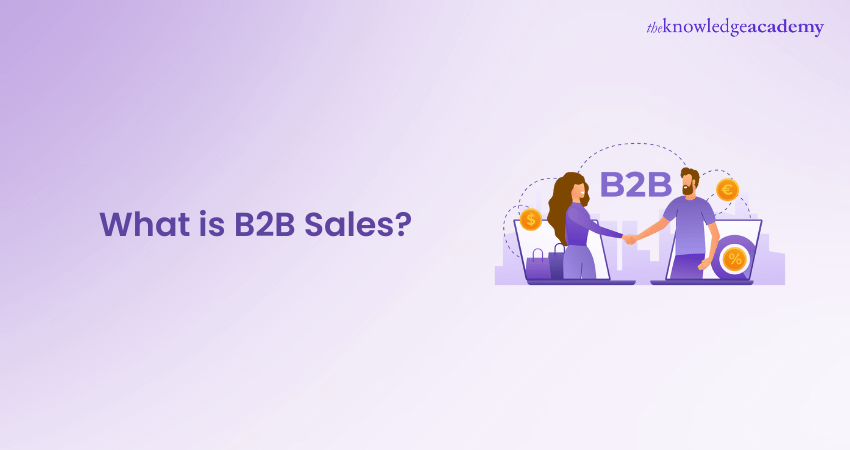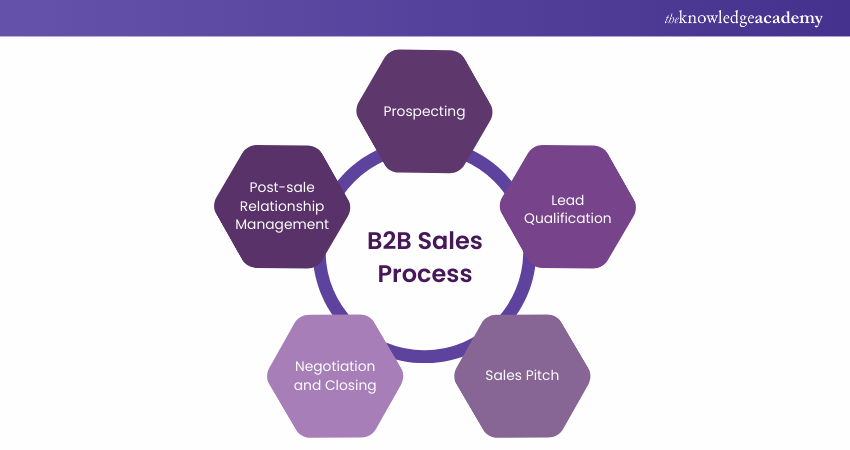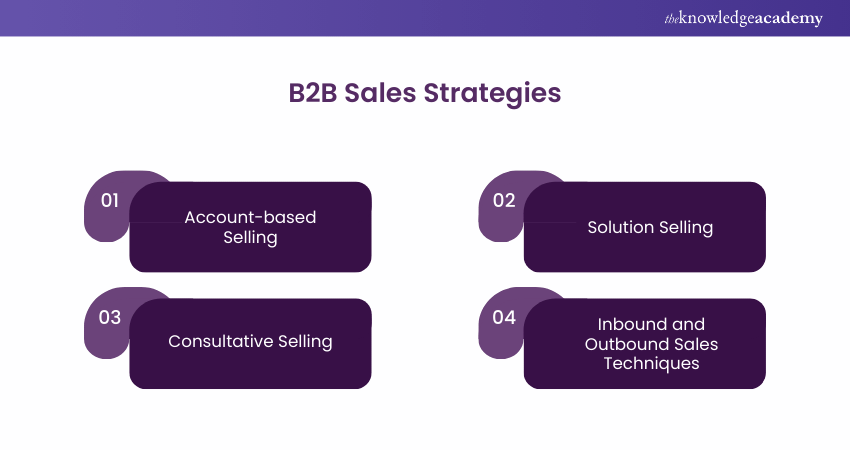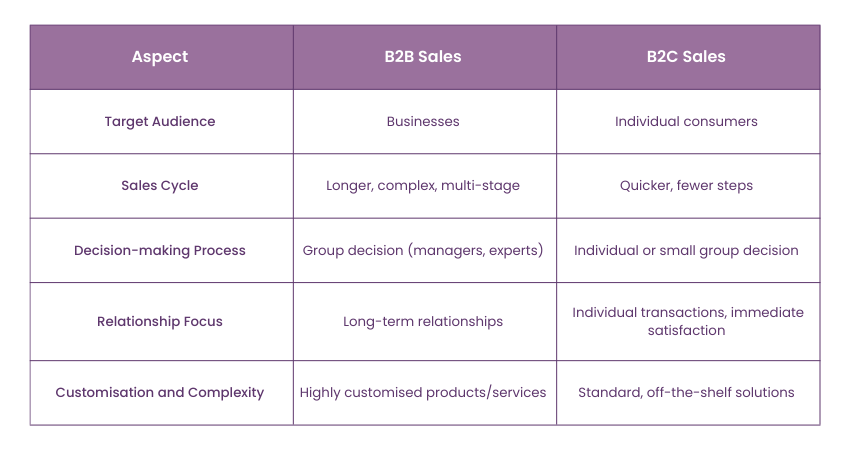We may not have the course you’re looking for. If you enquire or give us a call on +852 2592 5349 and speak to our training experts, we may still be able to help with your training requirements.
Training Outcomes Within Your Budget!
We ensure quality, budget-alignment, and timely delivery by our expert instructors.

Curious about the buzz around B2B Sales? It’s the intriguing process where businesses sell products or services to other businesses, creating a bustling marketplace that powers industries worldwide. Understanding "What is B2B Sales?" is key to grasping how these transactions drive economic growth, foster long-term partnerships, and enhance business success.
In this blog, we discuss the sales process and effective strategies that can give your business a competitive edge. Whether you're new to the concept or looking to deepen your understanding, this guide provides valuable insights into the exciting world of B2B Sales.
Table of Contents
1) What is B2B Sales?
2) What is the B2B Sales Process?
3) Benefits of B2B Sales
4) Examples of B2B Sales
5) B2B Sales Strategies
6) Tools and Technologies in B2B Sales
7) What's the Difference Between B2B Sales and B2C Sales?
8) Common Challenges in B2B Sales
9) Conclusion
What is B2B Sales?
B2B Sales, or Business-to-Business Sales, involves transactions between two businesses rather than between a business and a consumer (B2C Sales). In B2B Sales, companies sell products or services to other companies, which use them in their operations or sell them to their customers. This type of Sales Process is characterised by longer sales cycles, higher value transactions, and more complex decision-making processes compared to B2C Sales.
What is the B2B Sales Process?
The process is a series of steps that a sales team follows to convert potential business clients into customers. Here’s a detailed look at each stage:

a) Prospecting: It involves identifying potential customers who might benefit from your product or service. This can be done through various methods, such as networking, cold calling, online research, and using lead generation tools.
b) Lead Qualification: Once potential leads are identified, they need to be qualified to ensure they are a good fit for your product or service. This involves assessing their needs, budget, decision-making authority, and timeline for making a purchase.
c) Sales Pitch: The sales pitch is where the salesperson presents the product or service to the qualified lead. This stage involves demonstrating how the product can solve the lead’s problems and meet their needs. It's crucial to tailor the pitch to the specific challenges and goals of the prospective client.
d) Negotiation and Closing: After the pitch, the next step is negotiation. This stage involves discussing terms, pricing, and other details. The goal is to reach a beneficial agreement. Once both parties are satisfied, the deal is closed, and the contract is signed.
e) Post-sale Relationship Management: After the sale, it's essential to maintain a relationship with the customer. This involves providing ongoing support, addressing any issues, and looking for opportunities to upsell or cross-sell additional products or services.
Want to close more sales? Our Sales Training Courses are designed to equip you with the skills and strategies needed to succeed. Sign up now and start achieving more!
Benefits of B2B Sales
B2B Sales are crucial for several reasons:
a) Economic Impact: B2B transactions form the backbone of many industries. They drive the supply chains that keep businesses running, contributing significantly to the global economy.
b) Higher Transaction Values: It involves larger transactions compared to B2C sales. This means that each successful sale can have a substantial impact on a company's revenue.
c) Long-term Relationships: It leads to long-term relationships between businesses. These relationships can result in repeat business and a stable revenue stream.
d) Enhanced Customisation: It covers more personalised solutions tailored to the specific needs of each business client. This level of customisation can lead to higher client satisfaction and loyalty.
e) Business Growth and Scalability: Successful B2B Sales strategies can drive significant business growth and scalability. By securing large contracts and long-term deals, businesses can expand their operations, invest in new projects, and achieve sustainable growth.
Examples of B2B Sales
Here are the examples of B2B Sales:
Manufacturing and Wholesale
A manufacturer selling components to an electronics company is a classic example of B2B Sales. The electronics company uses these components to produce their final products. This relationship is essential for the electronics company to maintain its production line and ensure product quality.
Software and IT Services
A software company providing enterprise solutions to a large corporation is another example of B2B Sales. The corporation uses the software to streamline its operations and improve efficiency. This type of sale often involves customised software customise to meet the needs of the corporation.
Professional Services
Consulting firms, marketing agencies, and legal advisors offering their services to other businesses are examples of B2B Sales. These services help businesses solve specific problems or improve their operations. The expertise provided by these professionals can lead to significant improvements in business performance and strategy.
B2B Sales Strategies
Implementing effective B2B Sales strategies is essential for success in the competitive business landscape. Here are some key approaches that can help drive sales and build strong business relationships:

a) Account-based Selling: This strategy focuses on targeting particular accounts rather than casting a wide net. Sales teams work closely with marketing to tailor their approach to each target account’s unique needs and pain points.
b) Solution Selling: It involves understanding the customer’s problems and offering a product or service as a solution. This Sales Strategy emphasises the benefits and outcomes of the product rather than its features.
c) Consultative Selling: The salesperson acts as an advisor, helping the customer find the best solution to their problems. This involves asking the right questions, actively listening, and providing valuable insights.
d) Inbound and Outbound Sales Techniques: Inbound sales focus on attracting potential customers through content marketing, SEO, and social media. Outbound sales, on the other hand, involve reaching out to customers through cold calls, emails, and direct mail.
Learn about the different marketing policies with our Sales Management Training – Join today!
Tools and Technologies in B2B Sales
Using the correct tools and technologies can boost efficiency and success in B2B Sales. Let's explore:
a) Customer Relationship Management (CRM) Systems: This CRM system helps sales teams manage their interactions with customers. They provide valuable insights into customer behaviour, track communication history, and streamline the sales process.
b) Sales Automation Tools: These tools can handle repetitive tasks such as follow-up emails, scheduling meetings, and updating records. This allows teams to focus on important activities.
c) Data Analytics and Business Intelligence: These tools analyse large sets of data to provide insights into market trends and sales performance. This helps sales teams make decisions and improve their strategies.
d) Communication and Collaboration Tools: Tools like Slack, Microsoft Teams, and Zoom facilitate communication and collaboration within sales teams and with clients. They help streamline the sales process and improve efficiency.
Boost your B2B communication prowess with our B2B Communications Training – join now!
What's the Difference Between B2B Sales and B2C Sales?
Here are the key differences between B2B Sales and B2C Sales:

Target Audience
B2B Sales target other businesses, while B2C sales target individual consumers. This fundamental difference shapes the entire sales approach and strategy. B2B Sales often involve addressing the needs of entire organisations, which can be complex and multifaceted. In contrast, B2C sales focus on fulfilling personal preferences and requirements.
Sales Cycle
B2B Sales cycles are longer and complex due to the higher value and complexity of transactions. This extended cycle often includes multiple stages, such as extensive research, detailed proposals, and negotiations.
In contrast, B2C Sales are usually quicker, often completed in a single interaction or a few steps, and involve fewer decision-makers.
Decision-making Process
In B2B Sales, decisions are often made by a group of people within the company, each with their own priorities and concerns. This could include managers, procurement officers, and technical experts, all of whom need to agree before a purchase is made.
On the other hand, in B2C Sales, the decision-making process is usually simpler, typically involving just the consumer or a small number of people, and decisions are made based on personal preferences and immediate needs.
Relationship Focus
B2B Sales emphasise building long-term relationships with clients. These relationships are nurtured through ongoing communication, support, and the consistent delivery of value.
On the other hand, B2C Sales focuses more on individual transactions and immediate customer satisfaction, aiming to make each sale a positive experience to encourage future purchases.
Customisation and Product Complexity
B2B Sales often involve highly customised products or services customised to meet the needs of business clients. This can include bespoke solutions, detailed service agreements, and specialised support.
In contrast, B2C Sales usually involve standard products or services that require less customisation, catering to the broader consumer market with more straightforward, off-the-shelf solutions.
Common Challenges in B2B Sales
Here are some of the disadvantages of it:
a) Long Sales Cycles: The extended duration of B2B Sales cycles can be challenging. Sales teams need to stay engaged and maintain the prospect’s interest over a longer period.
b) Complex Decision-making Units: Selling to businesses often involves multiple stakeholders with different priorities. Sales teams must navigate these complexities and address the concerns of each decision-maker.
c) Competition and Market Saturation: The B2B market is highly competitive. Sales teams need to differentiate their products and services to stand out from the competition.
d) Adaptation to Technological Changes: Keeping up with rapid technological advancements can be challenging. Sales teams need to continuously update their knowledge and skills to leverage new tools and stay competitive.
Acquire in-depth information about negotiation strategies with our Sales Negotiation Training – Join today!
Conclusion
B2B Sales play a vital role in the business ecosystem, driving economic growth and facilitating the smooth operation of various industries. Understanding "What is B2B Sales?" and mastering the B2B Sales process is essential for businesses aiming to succeed in this domain. By focusing on building long-term relationships, customising solutions, and addressing the unique needs of business clients, companies can secure a stable and profitable position in the market.
Learn how to enhance your sales performance with our Outbound Sales Training – Join today!
Frequently Asked Questions

Businesses that are involved in B2B Sales include manufacturers, wholesalers, software companies, and professional service firms like consulting and marketing agencies. These businesses sell products to other companies.

Personalised communication helps build strong relationships with clients in B2B Sales. It shows that you understand their needs and challenges, making them more likely to trust and do business with you. This approach can lead to customer satisfaction and increased sales.

The Knowledge Academy takes global learning to new heights, offering over 30,000 online courses across 490+ locations in 220 countries. This expansive reach ensures accessibility and convenience for learners worldwide.
Alongside our diverse Online Course Catalogue, encompassing 17 major categories, we go the extra mile by providing a plethora of free educational Online Resources like News updates, Blogs, videos, webinars, and interview questions. Tailoring learning experiences further, professionals can maximise value with customisable Course Bundles of TKA.

The Knowledge Academy’s Knowledge Pass, a prepaid voucher, adds another layer of flexibility, allowing course bookings over a 12-month period. Join us on a journey where education knows no bounds.

The Knowledge Academy offers various Sales Training, including the Sales Management Training, Outbound Sales Training, and Sales Negotiation Training. These courses cater to different skill levels, providing comprehensive insights into Sales Performance Management.
Our Business Skills Blogs cover a range of topics related to sales offering valuable resources, best practices, and industry insights. Whether you are a beginner or looking to advance your sales negotiation skills, The Knowledge Academy's diverse courses and informative blogs have got you covered.
Upcoming Digital Marketing Resources Batches & Dates
Date
 Sales Bootcamp
Sales Bootcamp
Fri 17th Jan 2025
Fri 7th Mar 2025
Fri 23rd May 2025
Fri 18th Jul 2025
Fri 12th Sep 2025
Fri 12th Dec 2025







 Top Rated Course
Top Rated Course



 If you wish to make any changes to your course, please
If you wish to make any changes to your course, please


